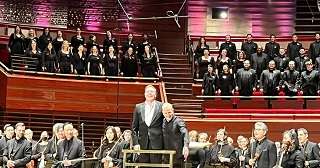|
Back
Bruckner No. 9 with Te Deum Philadelphia
Verizon Hall
05/05/2023 - & May 6, 2023
Anton Bruckner: Christus factus est – Symphony No. 9 in D minor – Te Deum (Nowak Edition)
Elza van den Heever (soprano), Michelle DeYoung (mezzo-soprano), Sean Panikkar (tenor), Ryan Speedo Green (bass-baritone)
Philadelphia Symphonic Choir, Joe Miller (director), Philadelphia Orchestra, Yannick Nézet‑Séguin (conductor)

J. Miller, Y. Nézet‑Séguin (© Diana Antal)
Anton Bruckner struggled to complete his Ninth Symphony as he lay dying in bed in Vienna, Austria, in 1896. Sadly, when his life ended, he had completed only three complete movements of what was clearly intended to be a four‑movement composition. Over the succeeding decades, Bruckner scholars have tracked down and, in some cases, have almost come close to assembling enough notes and sketches to create a new edition. But fearing he would leave behind three orphaned movements without a strong finale, Bruckner supposedly offered a suggestion: just add his Te Deum as a fourth-movement substitute (some scholars insist it was the conductor Hans Richter who made this suggestion, which the ailing composer accepted without argument). No matter that the Te Deum was composed in 1884 and stylistically different from—some might even say at odds with—the three‑movement Ninth. It was one way, possibly the only way, to save the symphony from oblivion.
While scholars continue to debate whether or not the Te Deum is appropriate, the Philadelphia Orchestra under the direction of Yannick Nézet‑Séguin took the plunge recently and went one step further. In two performances, Nézet‑Séguin not only substituted the Te Deum for the incomplete fourth movement, but also introduced the massive symphony with a sweet rendition of Bruckner’s motet, Christus factus est, sung a cappella under the direction of Joe Miller. Once I recovered from the shock of hearing the motet seamlessly transition into the instrumental first movement, all was well. Both motet and finale offer glorious music sung and played by some 200 artists, revealed in its original splendor if not the exact order Bruckner would have conceived. What followed was a stirring performance and a major step forward for the orchestra’s indefatigable director.
Nézet‑Séguin has matured tremendously in the 11 years he has been music director in Philadelphia. His earlier performances of classics were crowd‑pleasers, but a little thin compared with those by some of his illustrious predecessors. Despite the enormous increase in responsibilities in recent years, as he leads the orchestras of both Philadelphia and the Metropolitan Opera, his interpretative range has deepened. He senses and reveals the intention of the musicians, the composer, and his own understanding of a work and manages to sweep these impressions into a whole that connects the hearts and minds of listeners with great art.
Joining the orchestra and the Philadelphia Symphonic Choir were four excellent soloists in the two choral portions of the performance: Elza van den Heever, soprano, able to outsoar the mighty orchestral and choral forces around her, and Michelle DeYoung, mezzo-soprano, tender in the opening motet, commanding in the thundering Te Deum; Ryan Speedo Green, expressive bass-baritone, fresh from his critical triumph in Champion at the Met with Nézet‑Séguin; and Sean Panikkar, a light tenor of exceptional sensitivity.
To those who insist that a composer’s work is inviolable, I say this: Keep the original score as your lodestar. But don’t be afraid to take the occasional risk. Bruckner’s Ninth with enhancements can be an opportunity to explore undiscovered terrain, to hear other points of view, and learn to understand why the original work retains the status it has achieved.
Linda Holt
|